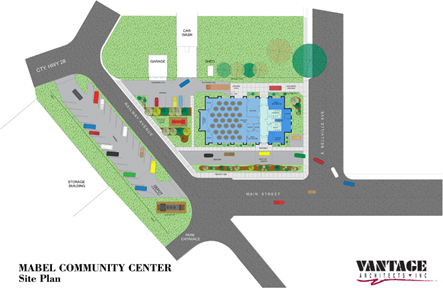SITE ANALYSIS & SELECTION
Site analysis is a vital step in the design process. It involves the evaluation of an existing or potential site in relation to the development program, environmental impact, impacts on the community and adjacent properties, project budget, and schedule. In the site analysis process Vantage Architects identifies environmental, program, and development constraints and opportunities. A well-executed site analysis forms the essential foundation for a cost-effective, environmentally sensitive, and rational approach to project development.
In recent years storm water management has become a key issue in site feasibility analysis and the site planning process. Early consideration of the site topography needs to be an integral part of the site analysis.
A comprehensive environmental assessment of a site has also become more important as clients become more environmentally aware and regulatory oversight increases. Clients want to avoid the expense and health risks that accompany environmental contamination on a site, as well as the cost of preventing any adverse impact on community environmental resources that could be caused by their activities.
Client Needs
Site analyses vary greatly depending on the owner’s situation, the project size, program complexity, and the site. One client may have defined a building program and be in search of a site. Another may have selected a site and be interested in fitting a development program to it. Yet another client may have both the site and program in hand and be seeking the most efficient, economical, and environmentally sensitive approach to site development.
Special Site Studies
Each site presents a unique set of issues and concerns. As part of site analysis, special studies may be required. Examples are utilities studies, environmental impact studies, historic resources inventories, and studies of special opportunities, such as the construction of co-generation plants or solid waste disposal systems. Many clients require the architect to provide assistance with planning and zoning approvals in conjunction with site analysis services. Increasingly, local authorities are engaging design consultants of their own (sometimes at the owner’s expense) to review project proposals.
Effective site analysis services can significantly preserve or add to the economic value of a project for the owner and definitely deserve compensation. As noted above, a good site analysis will enable the client to exploit the full development potential of a site. Effective planning and zoning assistance can maximize the potential for regulatory approvals and significantly reduce the owner’s risk of economic loss.

Site Analysis Services
Why a Client May Need These Services
- To evaluate development constraints and opportunities for a site
- To assess one or more sites as a basis for purchase
- To assess the infrastructure characteristics of a site
- To gain information as a basis for a zoning variance
Knowledge and Skills Required
- Knowledge of climate, topography, soils, and natural features
- Knowledge of site utility distribution systems
- Ability to evaluate site access and circulation factors
- Understanding of building sighting considerations
- Familiarity with planning and zoning ordinances
- Ability to analyze multiple factors objectively
- Ability to work with related or specialty disciplines
Representative Process Tasks
- Program investigation
- Site inventory and analysis
- Site evaluation
- Report development
Excerpt from The Architect’s Handbook of Professional Practice, 13th edition 2000

